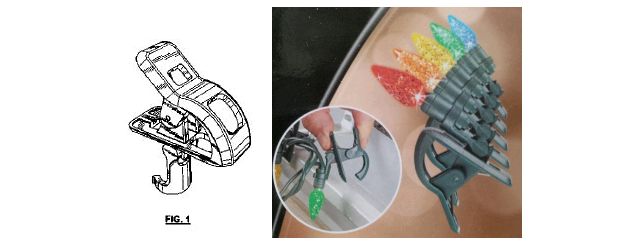It's less than two weeks until Christmas and if you have yet to hang your lights outside, you may be in the doghouse. Excuses are few at this point, so there's no harm in trying a longshot – you haven't strung the lights up because, well, it may be design infringement!
Canadian Tire is suing Wal-Mart for design infringement1 over Wal-Mart's sale in Canada of holiday lights with a spring-operated clip that can attach to a gutter, shingles, tree branch and the like. Canadian Tire is not claiming to own the general concept of a spring-operated clip-on light, just its own proprietary design. A drawing from the registered design is below, along with a photo of the corresponding product in action, from the Canadian Tire (Noma brand) package:

Canadian Tire also raised trademark and competition law issues that won't be discussed here. The Wal-Mart product could be potentially infringing if it has taken the Canadian Tire registered design or a design not substantially differing from it. You be the judge. Here is the registered design and the Wal-Mart product as alleged in the Canadian Tire Statement of Claim:

No defence has been filed yet (Wal-Mart defence is due December 19). The case will certainly not be tried in court before the holidays are over, and most IP cases settle before trial. The Wal-Mart product could not be found on its web site, so it's unknown at this point if sales are continuing or if the product was pulled. If the allegations of design infringement are proven in court, Canadian Tire could potentially get a court order for damages or an accounting of profits. There could also be a permanent injunction, requirement for delivery up of infringing clips, and an award of legal costs. It has also been suggested in the media that Canadian Tire could benefit from the publicity of this case.
What is the value of the IP developed by Canadian Tire? Let's have "the shelf" do the talking. A package of 75 of the proprietary Canadian Tire clips have a regular price of $14.99. There are also two brands of old school, non-spring loaded clips that sell in a package of 100 for $9.99. That is a 50 per cent price premium for fewer clips, which sounds good even though there would be a higher cost to manufacture the spring-loaded clips. So irrespective of the merits of this case (no opinion is being given here), this product is a good example of the potential power of an innovative design to improve profit margins. Of course, you also have to be able to sell at the improved profit margins to fully capture the advantage. The 75-pack was recently on clearance at a local Canadian Tire for $7.43. There is no way to know if Canadian Tire already sold a significant number of clips at the regular price and are just clearing out the remainder, or if consumers were reluctant to buy at the higher price point such that sales lagged. One thing for certain is that commercializing and enforcing IP to extract value is never straightforward, but is always interesting.
Happy holidays!
Footnotes
1 Canadian Tire Corporation, Limited v Wal-Mart Canada Corp., Tomson Merchandise Co. Ltd., and Everstar Merchandise Co. Ltd. (Federal Court of Canada file no. T-1926-15) re Canadian industrial design no. 158920.
The content of this article is intended to provide a general guide to the subject matter. Specialist advice should be sought about your specific circumstances.
